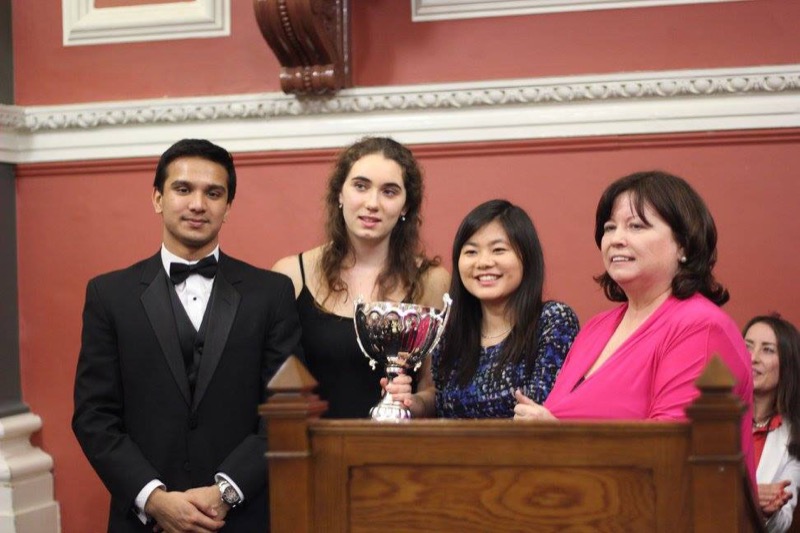Trinity and Harvard go Head-to-Head in Student Debate
Posted on: 04 March 2016
Debating teams from Trinity College Dublin and Harvard tackled the motion ‘This house is not afraid of cheap oil’ at the second of the annual Student Economic Review debates co-hosted with the Philosophical Society last month.
Trinity’s Jamie Donnelly was awarded the Gold Medal for best speaker while the Harvard team were announced winners in a close contest and were presented with the Vinay Nair trophy.
The motion was proposed by the Trinity team of Oisin Vince Coulter (Fourth year Classics and Philosophy), Jamie Donnelly (MSc High Performance Computing) and Izzy Sweeney (First year Jewish & Islamic Civilisations and Ancient History & Archaeology) with the Harvard team of Pavan Hegde (Economics Year 2), Joy Jing (Architecture and Environmental Science Year 3) and Krysianna Papadakis (Philosophy, Political Science and Economics Year 3) opposing. The debate was chaired by Patrick Geoghegan, Professor in Modern History and host of Newstalk’s Talking History programme.

The debate covered a wide range of areas, only appropriate given the influence that oil exerts in today’s world. It centred on the political, economic and environmental consequences of cheap oil, with both teams offering widely different takes on the outcomes of cheap oil in each of these domains.
The Trinity team argued falling oil prices will weaken authoritarian regimes propped up by oil revenues in counties like Russia and Saudi Arabia. Falling oil prices may reduce the capacity of these states (and the Islamic State) for military spending and subsequently diminish their ability to project their power and ideologies internationally. The proposition also argued that the West’s decreased reliance on these states for energy will allow them to speak out more about human rights abuses in and by these countries. Harvard argued that the objectives of these states will not change and they would simply find alternative sources of revenue and that lower oil-prices, and falling standards of living may actually lead to increased aggression as they attempt to shift the blame to the West.
The teams also disagreed on the consequences of cheaper oil for the economy. While both asserted that falling prices benefit consumers in oil importing countries, the Harvard team questioned whether the marginal benefit to these consumers is worth the cost to ordinary people in oil producing states (who are generally much poorer). Another point of contention was the effect of oil on the stock market, with Harvard arguing that low oil prices have caused a stock market crash and will cause persistent downward pressure on the S&P while Trinity contended that current low prices are merely a fluctuation caused by a re-adjustment.
The final area of discussion was the environmental consequences of cheaper oil. The proposition argued that low oil prices present an opportunity to renewable energy producers, and gives time to develop more efficient alternatives and tackle climate change. They also argued that lower oil prices would lead investors to back more profitable energy sources, leading to the development of renewables. Conversely the opposition contended that cheaper oil brought about by increased supply will lead to increased consumption and that low oil prices would damage renewable energy development as these energy sources will only be popular if oil is a worse option. If oil remains cheap, they claimed, consumers will not switch to alternate sources.
While the judges – Mary Harney, Aoife Cunningham, Rosalind Ni Shuilleabhain and Eoin O’Liathain – left the packed GMB chamber to deliberate the audience heard floor speeches from Ruth Lennon (JF PPES), Matthew Collins (SF PPES), Rory O’Sullivan (JF English and Ancient Greek) and Mark Finn (JF BESS). Professor Geoghegan then offered his entertaining take on the evening’s discussion.
The judging panel, chaired by Mary Harney, deliberated for twenty minutes before returning to the chamber to announce the winners.
About the Student Economic Review
Trinity’s Student Economic Review (SER) is an undergraduate journal, published annually by students, which prides itself in the encouragement and promotion of undergraduate research within the field of economics. The SER Committee is chosen from the third-year economics undergraduates by the Economics Department. These students are responsible for all matters relevant to the Review: editing, production, finance, sponsorship, web-design and event organisation. Typically the Committee also hold a series of debates and workshops throughout the year. Professor of Economics, John O’Hagan has presided over the work of the SER since its inception thirty years ago.
